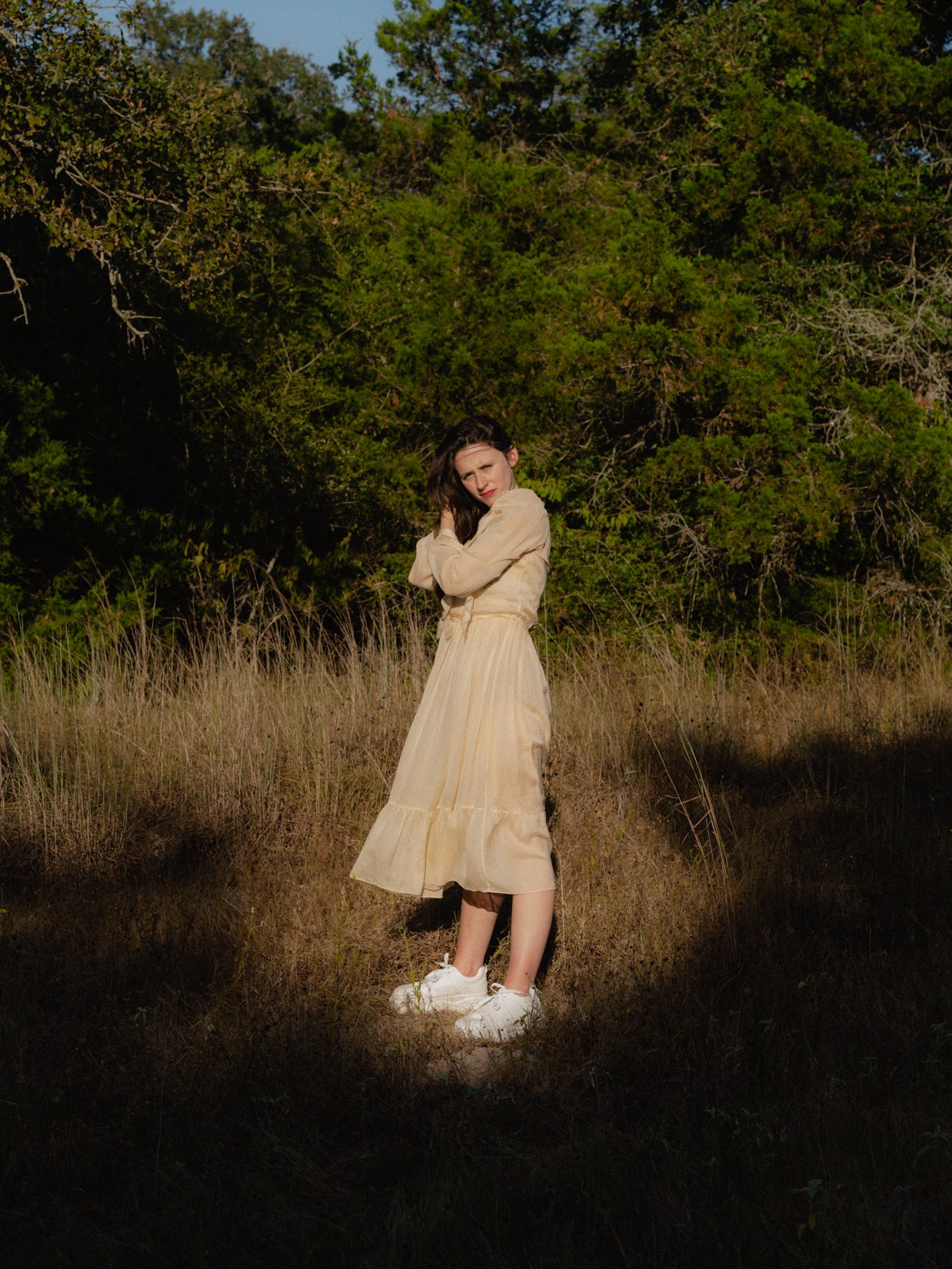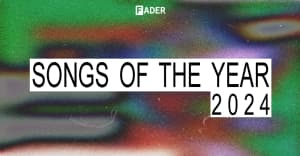 Photo: Molly Matalon
Photo: Molly Matalon
Katie Crutchfield's fifth album as Waxahatchee, Saint Cloud, is quite possibly her best to date — an impressive feat, considering that she's built a reputation as one of the most beloved indie rock songwriters of the past decade through a catalog of music that embraces raw and poetic lyrical perspectives, sometimes simultaneously. Bearing the mark of classic alt-country sounds, Saint Cloud centers around Crutchfield's decision to embrace sobriety, and the personal revelations and moments of self-reflection that often accompany such a decision.
The album is also the latest artistic evolution in a career that's seen Crutchfield consistently push herself and her songwriting into thrillingly unknown territory. We sat down with her over coffee (back when you could sit down with someone face-to-face) to revisit key songs throughout her career and how they represent and have shaped the artist and person she's become today.
"Grass Stain" [American Weekend, 2012]
I have an impulse not to revisit my earlier work. It's not about shame or anything like that, I just move forward really fast with my own creative intuition. But it's cool for me to go back in this instance, because I'm seeing things that give me perspective regarding my new album.
There's a line on this song where you say "I'll drink 'til I'm happy." You're sober now. How do you reflect on that lyric given your current state of mind?
I always knew deep down inside that I'd quit drinking one day. I wasn't ready to do that then, but I knew I'd do it at some point. It was buried psychologically. Romanticizing drinking was — I don't want to call it a crutch, but it was something that I leaned on as a songwriter. It's not that I judged sober people at that time, but I did the thing a lot of people do, where for a split second I'd hold my own behavior up against theirs.
"Dixie Cups & Jars" [Cerulean Salt, 2013]
I had the hardest time picking a song from this album, but when I wrote this one I'd never been so happy about how the lyrics turned out. It opened a door for me. I'd leaned hard into writing about relationships, love, and heartbreak, but Cerulean Salt leans more into addiction. This was the first song of that group of songs where I learned how to write about that. It sounds like Americana storytelling to me, and since I leaned into that again with this new album, it was cool to revisit this song.
What was your perception of adulthood then versus where you are now?
It's funny, because the thematic point of Cerulean Salt was leaving your teens, but at the time I was sharing a room with Alison in bunk beds. I was not an adult. But I'd left Alabama to come to New York, which in itself felt like a kind of adulthood. Every few years, we enter a new phase of adulthood, and this was my first step towards that. When I was making American Weekend, that concept hadn't even entered my mind. But I almost feel like it's pointless to identify the entry point into adulthood.
This album was also the first time you'd gotten substantial attention from the music press.
When I think back on that time, I'm really grateful for everything that happened before that. I'd been making music for so long before Cerulean Salt — I'd written four full-length albums, had a scene, and learned to be in a band. The careerism of it all never entered into it. When I got Best New Music on Pitchfork, I had no idea what it was. I got a bunch of texts that night saying, "Congrats!" and I was like, "Oh, that's a nice way to put it." Someone had to explain what it meant to me. I wish I didn't know what it was still — it felt so pure. But I was prepared for it in that making music meant so much to me, and because I was already so formed as a songwriter. It wasn't like the first thing I'd ever done had gotten the attention.
"La Loose" [Ivy Tripp; 2015]
I tried to pick songs where, the moment I wrote them, it felt like there was something special about it. This melody had been in the back of my head for a long time. When I go back and listen to it now, it's really about alcoholism and the harsh realities of life as a touring musician. It's a love song, and it's about a relationship, but when I read between the lines, it's about struggling.
With every record, I try to take on some new challenge — whether it's something I'm hyperaware of or something I see in hindsight. With Ivy Tripp, I leaned hard into poetry and symbolism to make it more abstract. That definitely comes into play with this song. Previously, I'd had fans, but no one was picking apart my lyrics or anything. I knew people were going to be paying attention to Ivy Tripp. When I made it, I basically quarantined myself in Long Island to shut the world out, and it was the right decision. But also, I was struggling during that time, and I didn't want to look too closely at myself too.
Have you been conscious about the level of vulnerability you've shown over the years?
Where I am right now, I don't feel super guarded. I feel a hundred times more comfortable putting myself through my music than on the internet. People will feel empowered, and I feel comfortable sharing. Ivy Tripp was an interesting time, because it was me finding my footing, and when I look back, I was vulnerable, sharing, and truthful, but I also felt like I had to have a bit of a veil when it came to what I was trying to communicate.
"Sparks Fly" [Out in the Storm; 2017]
I picked this one because it felt like one of the songs on Out in the Storm that I still relate to. That record was so urgently written. It was a really rough time in my life — but that's been my preface for every one of these. [Laughs] It was during a breakup, along with some life changes. I've processed all of it and moved on now, but when I go back to this one, I was like, "Wow, I was really angry." I'm good now, though. On every one of my records, there's one song that's more about platonic love and how that can be empowering, and "Sparks Fly" is that. It's about my sister and our friendship, and it's peaceful.
When you hear past anger in your work, do you feel the need to distance yourself from those emotions?
I don't feel so much embarrassed about it as I was hyperaware that I could be embarrassed by it while I was writing it. I didn't want to be straight-up emo, but I wanted it to be really raw. I've moved to different cities, been in different relationships, and changed a lot in my life. I've moved on.
Are there any moments from this time where you don't remember it that fondly?
Oh, yeah. I describe it as seeing a photo of yourself where you're like, "Why did I straighten my hair that way?" I feel that about every record, it's just cringe-y. One thing I noticed about this album compared to Saint Cloud is that there was so much atmosphere on Out in the Storm — a lot of stuff happening. It was really chaotic, which was great for the story I was telling. The atmosphere really heightened the anxiety. But Saint Cloud is so clear and calm — no fat that's needed to be trimmed. They weren't conscious decisions I made in the studio, just organic.
How was working with John Agnello on Out in the Storm?
The last few albums I'd made before this were essentially home recordings produced by Kyle Gilbride, my dude from the Philly DIY scene. With John, it was the first time I'd worked in the studio with a music professional. In the past, it'd been just friends doing each other favors. But with John, he pushed me when I needed to be pushed and didn't when I didn't. My friend Katie Harkin [who contributed instrumentation on the album] also really understood the atmosphere I was creating for this album.
"Chapel of Pines" [Great Thunder EP; 2018]
I wrote this song around the time I wrote Cerulean Salt, for a different band, and then I re-recorded it for this EP. This EP was a big exercise for me to flex my poetic muscles and write about other stuff out of thin air that isn't rooted in something that happened to me. I was trying to evoke different imagery for this song, and the video was inspired by Terence Malick, so I had a lot of Days of Heaven in my mind. I was trying to make something that felt interesting, lush, and poetic — and I think it feels that way when you listen back. It doesn't feel like something you can quite put your finger on.
Besides Malick, who are some non-musical artists that inspire you?
With Great Thunder, I was reading a lot of poetry and finding ways that they communicate emotions. I usually turn to it if I'm struggling to write — to knock out the cobwebs a bit. I can't look at other peoples' lyrics, though. I'm like, "No, I need to pretend that I'm the only person that writes music."
"Fire" [Saint Cloud; 2020]
I was on a road trip from Birmingham to Kansas City, and the lyrics and melody to the first and last part of the song hit me as I was driving over the Mississippi River. It was the first time that had happened without me sitting down and working on a song. The melody felt huge to me from the beginning, and when I got home I wrote the whole thing. The song felt like me singing to my inner child.
It was very intentional to evoke Lucinda Williams on this album — her songwriting is huge. During my early adolescence, people were really pushing her on me and I was like, "I'm good." I liked it, but I never embraced it. Then four or five years ago, I finally did, and now she's my favorite songwriter. Obviously, I wanted it to sound like myself, but I took a lot of cues from her for sure.
This record marks a new decade for you. What's changed for you in the last 10 years?
I've made a lot of music in the last decade — maybe I'll make four albums instead of five. [Laughs] But I feel like I'm softer now. When I was younger, I was hardened to the world and wanted to take everything on, but now I'm gentler with myself and with other people. I feel like that has been the big perspective shift for me. Musically, the country classics were really formative for me when I was younger, and in the early days of Waxahatchee I was fighting that. I wanted everything to be weird and punk. Now I'm starting to lean more into what was formative for me — Dolly Parton, Emmylou Harris. Rather than getting in my head about what's cool, I'm trying to embrace what's natural.
